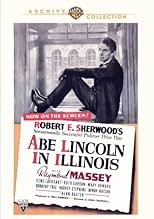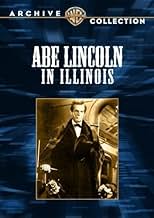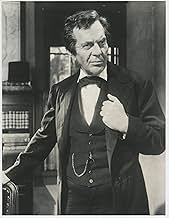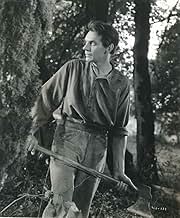IMDb RATING
7.3/10
2.2K
YOUR RATING
Humble Abraham Lincoln gains the respect of his Illinois neighbors, growing in stature and respect until he is elected President in 1860 and departs for Washington.Humble Abraham Lincoln gains the respect of his Illinois neighbors, growing in stature and respect until he is elected President in 1860 and departs for Washington.Humble Abraham Lincoln gains the respect of his Illinois neighbors, growing in stature and respect until he is elected President in 1860 and departs for Washington.
- Nominated for 2 Oscars
- 2 wins & 2 nominations total
Howard Da Silva
- Jack Armstrong
- (as Howard da Silva)
Featured reviews
Abe Lincoln is one of the most misunderstood figures in American history--perhaps THE most misunderstood. So much of what we assume are facts are actually myths and misrepresentations--some of which were promoted by writers and some by films of the 30s and 40s. While ABE LINCOLN IN ILLINOIS is far from perfect, it is light-years ahead of the other contemporary works in giving a balanced account of Lincoln's life. While heroic in many ways, Lincoln is more of a man in this film and the facts are generally true--and that's a lot more than can be said of such sentimental hogwash as D.W. Griffith's 1930 fiasco ABRAHAM LINCOLN--which is basically one myth after another strung together!! I can say all this because I am well educated about the man and am an American history teacher--so my opinion should mean something.
One of the common myths that has abounded was the Ann Rutledge romance. While it's uncertain exactly how much they were in love (was it just a passing romance or something deeper), it's obvious that they were NOT as they were portrayed in ABRAHAM LINCOLN with all of its syrupy sweetness. Read up on the controversy yourself--opinions vary and there's no concrete evidence to prove either extreme. Here in ABE LINCOLN IN ILLINOIS, they seem to take the position that the love between them was just beginning to blossom when she died and that that was about it.
Another myth is that Lincoln was 100% against slavery and that he personally freed the slaves (that was actually done by Congress and the 13th amendment). The real life Lincoln, though opposed to slavery, was more concerned with unity and preserving the nation. Fortunately, ABE LINCOLN IN ILLINOIS gets this right--they show Lincoln as being torn by these two divergent interests. Most books and films portray him as "the Great Emancipator"--though Lincoln would have allowed slavery to keep the country from war and he did see class distinctions between the races.
The other big myth is that Lincoln was sort of a "dumb hillbilly" and that he stumbled into greatness. While in this film he is a simple man, of sorts, he also is amazingly clever and has a great way with dealing with people. And, occasionally, he was a bit devious. While the film doesn't have a chance to show his political savvy and willingness to "forget" the Constitution during the war in order to keep the country together, he is relatively shrewd in this film.
As for Mary Todd, in the film as in real life, she was a conniver and a very unstable woman. While her mental instability was only briefly shown in this film (as in reality--her mental condition greatly deteriorated after her husband was President as well as his death) but at least it was mentioned. Plus, her intense drive was a major focus of the film--as it was in Lincoln's own real life. She was a hard-driving and rather nasty woman if you read more about her (and rather mentally unstable in her later years).
As a long-winded teacher, I could go on, but probably should wrap it up now. The film is reasonably accurate and tends to show Lincoln, warts and all--something films up until then neglected. Additionally, Raymond Massey's performance was superb and the film was both entertaining and inspiring. Interestingly enough, Massey was a Canadian and did a much better job than the Americans who have tackled this role.
One of the common myths that has abounded was the Ann Rutledge romance. While it's uncertain exactly how much they were in love (was it just a passing romance or something deeper), it's obvious that they were NOT as they were portrayed in ABRAHAM LINCOLN with all of its syrupy sweetness. Read up on the controversy yourself--opinions vary and there's no concrete evidence to prove either extreme. Here in ABE LINCOLN IN ILLINOIS, they seem to take the position that the love between them was just beginning to blossom when she died and that that was about it.
Another myth is that Lincoln was 100% against slavery and that he personally freed the slaves (that was actually done by Congress and the 13th amendment). The real life Lincoln, though opposed to slavery, was more concerned with unity and preserving the nation. Fortunately, ABE LINCOLN IN ILLINOIS gets this right--they show Lincoln as being torn by these two divergent interests. Most books and films portray him as "the Great Emancipator"--though Lincoln would have allowed slavery to keep the country from war and he did see class distinctions between the races.
The other big myth is that Lincoln was sort of a "dumb hillbilly" and that he stumbled into greatness. While in this film he is a simple man, of sorts, he also is amazingly clever and has a great way with dealing with people. And, occasionally, he was a bit devious. While the film doesn't have a chance to show his political savvy and willingness to "forget" the Constitution during the war in order to keep the country together, he is relatively shrewd in this film.
As for Mary Todd, in the film as in real life, she was a conniver and a very unstable woman. While her mental instability was only briefly shown in this film (as in reality--her mental condition greatly deteriorated after her husband was President as well as his death) but at least it was mentioned. Plus, her intense drive was a major focus of the film--as it was in Lincoln's own real life. She was a hard-driving and rather nasty woman if you read more about her (and rather mentally unstable in her later years).
As a long-winded teacher, I could go on, but probably should wrap it up now. The film is reasonably accurate and tends to show Lincoln, warts and all--something films up until then neglected. Additionally, Raymond Massey's performance was superb and the film was both entertaining and inspiring. Interestingly enough, Massey was a Canadian and did a much better job than the Americans who have tackled this role.
Episodic recounting of Lincoln's life up to the Presidency. Written by Robert Sherwood, one of FDR's speechwriters. Good performances by Ruth Gordon, Alan Baxter, Howard DaSilva, Clem Bevans.
Massey is the definitive movie Lincoln. Excellent work, emotional range and depth. Much better than Henry Fonda, whose Lincoln was apparently in some kind of trance.
May seem a little dated to modern audiences; occasionally strives for emotional poignancy that now comes across as somewhat corny.
Lots of little details, good depictions of frontier life, political campaigns in the 1800's. Includes two of Lincoln's best speeches from that period, with Massey's performance very close to Lincoln's 19th century oratorical style.
Highly recommended to students of American history and fans of old movies.
Massey is the definitive movie Lincoln. Excellent work, emotional range and depth. Much better than Henry Fonda, whose Lincoln was apparently in some kind of trance.
May seem a little dated to modern audiences; occasionally strives for emotional poignancy that now comes across as somewhat corny.
Lots of little details, good depictions of frontier life, political campaigns in the 1800's. Includes two of Lincoln's best speeches from that period, with Massey's performance very close to Lincoln's 19th century oratorical style.
Highly recommended to students of American history and fans of old movies.
I have seen this film probably 15 times or more and have been a devotee of the Lincoln mythology (for lack of a better term) for nearly 20 years. I remember first seeing the film as a youngster on the same weekend as the death and funeral of President Kennedy in November of 1963. At that time, the two scenes that struck me as most memorable to my young mind was the one where the local woman tells Lincoln that he is the homeliest man in the county; and, the other scene where Lincoln is telling the slightly off-color joke to a crowd about the man fighting the bear. Also, another visual that sticks in my memory is the somewhat haunting scene where Lincoln revisits New Salem after the once thriving city has become a ghost-town.
There are several marvelous aspects of this movie. To begin with, is the near perfect physical and emotional representation of Lincoln by Raymond Massey. Given the photographs of the pre-president Lincoln, making Massey into sixteenth president seems nearly ordained from the beginning. The height, facial structure, and body type is nearly a perfect fit. Regarding how Lincoln spoke, it is hard to determine if that is an accurate representation or not. Historical accounts of Lincoln says that he had a rather high and not necessarily soothing voice. Since, it would be another 30 plus years before there is any kind of recording device, Massey's voice should seem appropriate enough.
Additionally, the cinematography is excellent. The on-location or natural shots are superior by black and white standards. Even though I am a devotee of black and white films, color films seem to have the upper hand when filming wide-open or rustic environments. The feel of the indoor scenes such as the ones within the Lincoln Springfield home is nearly perfect for the times. You can virtually smell the cigar smoke or the burning wood stove. Finally, the lighting during the campaign speech scenes are awesome.
But, the best part of the movie is how even with some artistic license the characters surrounding Lincoln are historically strong and represent in a film microcosm a very accurate historical reality of Lincoln's early years. For example, starting with Ruth Gordon's portrayal of Mary Linoln Todd. With her character, you can easily feel how much she effected Lincoln. Her persistent pressure on Lincoln to achieve political importance and her hard-nose, sometimes loving, sometimes bitter prescience is from my historical reading just about perfect. Since the film takes place before Lincoln is actually president, Mary Todd Lincoln's shenanigans within the White House or her emotional unraveling in her later years is not an issue here.
The romance demonstrated between Lincoln and Ann Rutledge, although later to be historically challenged, then even later to be considered historically (possibly) significant, is quite sadly moving. It is nicely juxtaposition-ed against the image of Mary Lincoln Todd.
Howard De Silva as New Salem's local ruffian is although somewhat embellished, still represents Lincoln's ability to relate to people from all walks of life. The film just seems to find the vital essence of young Lincoln before he became president.
The surreal, final scene of Lincoln leaving Springfield for Washington D.C. (again although actually happening during the day during a rainstorm)after giving one of his many great historical speeches ("this is where I have lived") catches the eerie but profound feel of how important his leadership is going to mean to the struggling republic. The playing of the "Battle Hymnn of the Republic" although premature, is still simple perfect.
There are several marvelous aspects of this movie. To begin with, is the near perfect physical and emotional representation of Lincoln by Raymond Massey. Given the photographs of the pre-president Lincoln, making Massey into sixteenth president seems nearly ordained from the beginning. The height, facial structure, and body type is nearly a perfect fit. Regarding how Lincoln spoke, it is hard to determine if that is an accurate representation or not. Historical accounts of Lincoln says that he had a rather high and not necessarily soothing voice. Since, it would be another 30 plus years before there is any kind of recording device, Massey's voice should seem appropriate enough.
Additionally, the cinematography is excellent. The on-location or natural shots are superior by black and white standards. Even though I am a devotee of black and white films, color films seem to have the upper hand when filming wide-open or rustic environments. The feel of the indoor scenes such as the ones within the Lincoln Springfield home is nearly perfect for the times. You can virtually smell the cigar smoke or the burning wood stove. Finally, the lighting during the campaign speech scenes are awesome.
But, the best part of the movie is how even with some artistic license the characters surrounding Lincoln are historically strong and represent in a film microcosm a very accurate historical reality of Lincoln's early years. For example, starting with Ruth Gordon's portrayal of Mary Linoln Todd. With her character, you can easily feel how much she effected Lincoln. Her persistent pressure on Lincoln to achieve political importance and her hard-nose, sometimes loving, sometimes bitter prescience is from my historical reading just about perfect. Since the film takes place before Lincoln is actually president, Mary Todd Lincoln's shenanigans within the White House or her emotional unraveling in her later years is not an issue here.
The romance demonstrated between Lincoln and Ann Rutledge, although later to be historically challenged, then even later to be considered historically (possibly) significant, is quite sadly moving. It is nicely juxtaposition-ed against the image of Mary Lincoln Todd.
Howard De Silva as New Salem's local ruffian is although somewhat embellished, still represents Lincoln's ability to relate to people from all walks of life. The film just seems to find the vital essence of young Lincoln before he became president.
The surreal, final scene of Lincoln leaving Springfield for Washington D.C. (again although actually happening during the day during a rainstorm)after giving one of his many great historical speeches ("this is where I have lived") catches the eerie but profound feel of how important his leadership is going to mean to the struggling republic. The playing of the "Battle Hymnn of the Republic" although premature, is still simple perfect.
If you've ever wanted to hear what Abe Lincoln sounded like, this is the film you'll want to see. Lincoln is portrayed by the late Canadian actor Raymond Massey - who, amongst many other roles, is also remembered from HG Welles' Things to Come, the screenplay of which was written by HG Welles himself. Early in Massey's career, Lincoln's son, Robert Todd Lincoln, heard him perform and was struck by the similarity between Massey's speaking voice and that of his father. Since there are no recordings of Lincoln from that era shortly before Edison invented the Gramophone, we have to rely on descriptions of his voice. Some from that time state Lincoln's voice was high-pitched, and that Massey did not do the voice properly - however, I tend to give more credence to a living witness, Lincoln's own eldest son who, though he died 14 years prior to this film, still had the opportunity to see Massey on stage and hear his voice. Massey got it right, and this is one wonderful film - too bad I haven't found it on DVD - the next time it airs on TMC I'll have to record a DVD of it for myself.
With all due respect to Henry Fonda, Walter Huston, and a myriad of other cinematic Lincolns, Raymond Massey is the Abe to end all Abes. His moving and mesmerizing performance gives us the real Mr. Lincoln in all his complexity. Alongside the warmth, compassion and humor for which we love and revere Mr. Lincoln, we see in Massey the dark side as well: the doubts, fears, indecision and deep melancholia with which Abraham Lincoln struggled his whole life, and which clashed with his fierce ambition. Ruth Gordon is superb as Lincoln's equally ambitious wife, Mary Todd Lincoln. No hagiography, this movie lets us see the Lincolns as human beings with real "issues", rather than mere heroes of history.
Besides all this, we have Massey's astonishing physical resemblance to Lincoln.
What's most amazing is that the spirit of this most quintessentially American of our American heroes should be so wonderfully captured and portrayed by.... a Canadian!
Besides all this, we have Massey's astonishing physical resemblance to Lincoln.
What's most amazing is that the spirit of this most quintessentially American of our American heroes should be so wonderfully captured and portrayed by.... a Canadian!
Did you know
- TriviaAfter his success playing Lincoln in the film and on Broadway, Raymond Massey began to assume the character in real life. He often appeared at social gatherings dressed in Lincoln-esque attire, assuming a Lincoln-like manner and speech. His friend, the playwright George S. Kaufman, observed, "Massey won't be satisfied until someone assassinates him."
- GoofsWhen results for the 1860 election are being received, West Virginia is listed on the the state-by-state tally board. West Virginia didn't become a state until 1863, when it broke off from Virginia after that state had seceded from the Union.
- Quotes
Mentor Graham: Well, Abe, there are always two occupations open to those who have failed at everything else: school teaching and politics.
- ConnectionsFeatured in History Brought to Life (1950)
- SoundtracksOld Abe Lincoln Came Out of the Wilderness
(uncredited)
Traditional
Sung by chorus over opening credits
- How long is Abe Lincoln in Illinois?Powered by Alexa
Details
Box office
- Gross US & Canada
- $1,451,880
- Runtime
- 1h 50m(110 min)
- Color
- Aspect ratio
- 1.37 : 1
Contribute to this page
Suggest an edit or add missing content






































